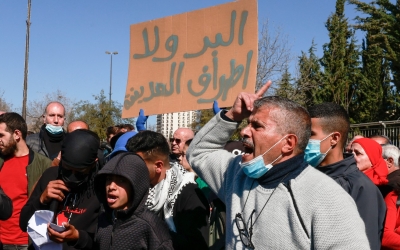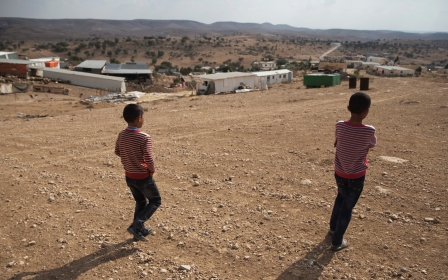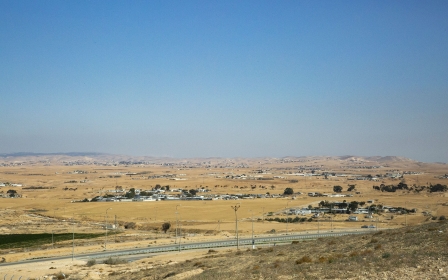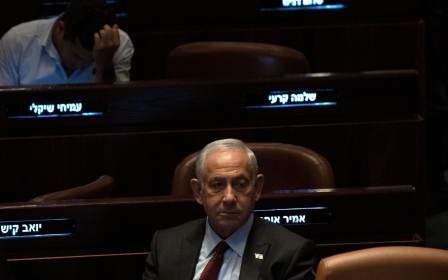Negev: Israel carries out largest demolition of Palestinian homes in years
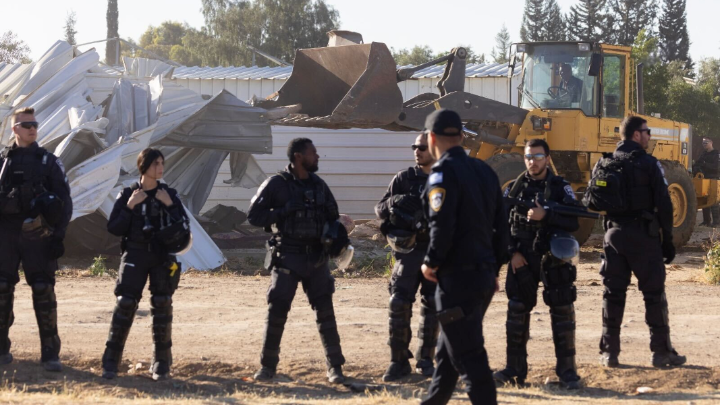
Israeli bulldozers, under the protection of police forces, on Wednesday destroyed 47 Bedouin homes in the southern Negev region, in the largest day of demolitions in years.
The demolitions, near Umm Butin village, targeted the houses of members of the same family, Abu Asa, leaving hundreds of them without a home.
Israeli authorities carried out the demolition under the pretext that the structures did not have the proper building permits, which are very rarely granted to Palestinian Bedouins in the Negev desert, known as the Naqab in Arabic.
Several Abu Asa family members decided to burn down their own homes prior to the operation rather than watch the Israelis destroy them. One Palestinian, Ahmed Abu Asa, was arrested after he tried to obstruct the bulldozers.
Kayed Abu Latif, a farmer and agricultural studies researcher, said the demolition order was “surprising”, especially given that Palestinian citizens in the area had helped Israelis during the Hamas-led attack on southern Israel on 7 October.
New MEE newsletter: Jerusalem Dispatch
Sign up to get the latest insights and analysis on Israel-Palestine, alongside Turkey Unpacked and other MEE newsletters
“The Arab community, especially in the Negev, made great sacrifices, especially the Abu Asa family, at the beginning of the war on 7 October. They contributed in saving the lives of many Israelis in the Gaza Envelope and the Sderot areas,” Abu Latif told Middle East Eye.
“The Israeli government is blatantly ignoring the sacrifices made by the Palestinian community in the Negev during the war.”
Abu Latif said Wednesday’s operation was the largest home demolition carried out in a single day in the Negev in years.
Before destroying the houses, Israeli authorities also confiscated furniture, taking it away in trucks, Abu Latif said.
In one video posted by local media, a Palestinian woman can be seen talking to police after they confiscated personal belongings, including momentos and photo albums, that she had taken out of her home.
'An organised crime'
The area where the demolitions were taking place was closed off by police in the early hours of Wednesday. A Palestinian member of Israel's parliament, the Knesset, was prevented from approaching the site.
The High Follow-Up Committee for Arabs in the Negev, a political body representing the needs of Palestinian citizens of Israel, said in a statement that the demolitions have left women, children and the elderly out in the open under the scorching sun, without shelter or anywhere to go.
“The destruction of the homes of hundreds of citizens is an organised crime and a dangerous indicator of the hostile practices against Palestinian citizens of Israel, particularly in the Negev, led by National Security Minister Itamar Ben Gvir,” Jumaa al-Zabarqeh, a member of the committee, told local media.
Ben Gvir praised the demolitions as “an important step towards restoring governance”, promising in a post on X that more homes would be torn down.
The committee said Israel is forcing the Abu Asa family to move to a different area in order to pave and expand Highway 6 to the south, adding that Ben Gvir's aim was “deepening racial discrimination”.
“The family has refused to move to the location proposed to them by the Israelis and are demanding to live in the agreed-upon neighbourhood of Tel al-Saba," it added.
Abu Latif said the community was not against paving the highway, but wanted to be given a real solution to their situation first.
“Before thinking of the highway, they should first think of the lives of the people whose fate is now unknown.”
Around 300,000 Palestinian citizens of Israel live in the Negev region, including 100,000 who live in 30 unrecognised villages that lack essential public services, including means of transportation, roads and schools.
Palestinian citizens in the Negev, who constitute 32 percent its population, say that Israeli authorities have attempted to force them out and destroy their nomadic way of life for decades, through various tactics.
These include confiscation of lands from native Palestinians and turning landowners into tenants. Additionally, the Israeli government has been accused of preventing the expansion of Palestinian villages and encircling them with new Jewish settlements.
Middle East Eye delivers independent and unrivalled coverage and analysis of the Middle East, North Africa and beyond. To learn more about republishing this content and the associated fees, please fill out this form. More about MEE can be found here.


